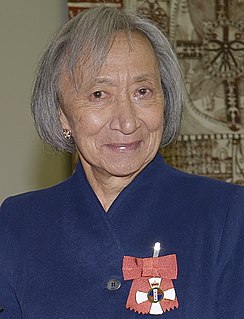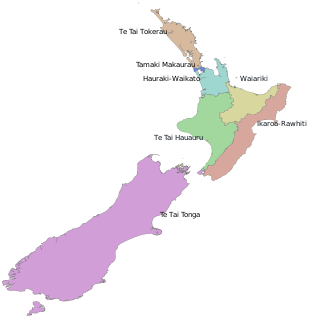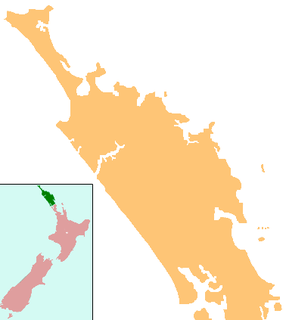
Māori, also known as te reo, is an Eastern Polynesian language spoken by the Māori people, the indigenous population of New Zealand. Closely related to Cook Islands Māori, Tuamotuan, and Tahitian, it gained recognition as one of New Zealand's official languages in 1987. The number of speakers of the language has declined sharply since 1945, but a Māori language revitalisation effort slowed the decline, and the language has experienced a revival, particularly since about 2015.
Aotearoa is the Māori name for New Zealand. It was originally used by the Māori people in reference to only the North Island but, since the late 19th century, the word has come to refer to the country as a whole. Several meanings have been proposed for the name; the most popular meaning usually given is "land of the long white cloud", or variations thereof. This refers to the cloud formations which helped early Polynesian navigators find the country.
Iwi are the largest social units in Aotearoa Māori society. The Māori-language word iwi means "people" or "nation", and is often translated as "tribe", or "a confederation of tribes". The word is both singular and plural in the Māori language. Māori use the word rohe to describe the territory or boundaries of iwi.

The haka is a ceremonial dance or challenge in Māori culture. It is performed by a group, with vigorous movements and stamping of the feet with rhythmically shouted accompaniment. Although commonly associated with the traditional battle preparations of male warriors, haka have long been performed by both men and women, and several varieties of the haka fulfill social functions within Māori culture. Haka are performed to welcome distinguished guests, or to acknowledge great achievements, occasions or funerals.

Māori Television is a New Zealand television station that broadcasts programmes that make a significant contribution to the revitalisation of the Māori language and culture. Funded by the New Zealand Government, the station commenced broadcasting on 28 March 2004 from its studios in Newmarket, Auckland.

The Māori Party is an indigenous rights-based centre-left political party in New Zealand. Tariana Turia founded the party in 2004 after resigning from the governing centre-left Labour Party, in which she was a minister, over the foreshore and seabed ownership controversy. She and Pita Sharples, a high-profile academic, became the first co-leaders.

Dame Georgina Manunui te Heuheu is a New Zealand Māori politician. She was a Member of Parliament (MP) from the New Zealand National Party List, and a Cabinet Minister in the New Zealand Government.

In New Zealand politics, Māori electorates, colloquially known as the Māori seats, are a special category of electorate that gives reserved positions to representatives of Māori in the New Zealand Parliament. Every area in New Zealand is covered by both a general and a Māori electorate; as of 2002, there are seven Māori electorates. Since 1967 candidates in Māori electorates have not needed to be Māori themselves, but to register as a voter in the Māori electorates people need to declare they are of Māori descent.
Adam Craig Parore is a former wicket-keeper and batsman for the New Zealand cricket team. He played 78 Test cricket matches for New Zealand and 179 One Day International cricket matches. Latterly, Parore is the managing director of financial services firm Adam Parore Mortgages.

The Māori King Movement, called the Kīngitanga or Kiingitanga in Māori, is a movement that arose among some of the Māori tribes of New Zealand in the central North Island in the 1850s, to establish a role similar in status to that of the monarch of the British colonists, as a way of halting the alienation of Māori land. The Māori monarch operates in a non-constitutional capacity with no legal or judicial power within the New Zealand government. Reigning monarchs retain the position of paramount chief of several tribes (iwi) and wield some power over these, especially within Tainui.

Hone Pani Tamati Waka Nene Harawira is a New Zealand Māori activist and former parliamentarian. He was elected to the New Zealand Parliament for the Māori electorate of Te Tai Tokerau in the 2005 general election as the Māori Party candidate. His resignation caused the Te Tai Tokerau by-election, held on 25 June 2011, which he won with a majority of 1117. As Leader of the Mana Movement and Member of Parliament for Te Tai Tokerau, he sat on the front bench in the New Zealand House of Representatives until losing the seat in the 2014 general election.

Te Ururoa James William Ben Flavell, also known as Hemi Flavell, is a New Zealand politician who has been a co-leader of the Māori Party since 2013 and represented the Waiariki electorate for the party in Parliament from 2005–2017.
The following lists events that happened during 1846 in New Zealand.
The first Christian mission is established at Rangihoua. The Hansen family, the first non-missionary family also settles there. Samuel Marsden explores the Hauraki Gulf and travels to within sight of Tauranga Harbour. The first book in Māori is published in Sydney. The first European is born in New Zealand.

Awanui is an historical river port in the far north of New Zealand, on the banks of the Awanui River just before it flows into Rangaunu Bay. Awanui lies at the south end of the Aupouri Peninsula in the Far North District Council of the Northland Region, approximately 7 km north of Kaitaia. The river port has ceased operation and a recreational wharf is located at Unahi, on the shore of Rangaunu Bay, approximately 3 km north of the township. The traditional name of Awanui was Kaiwaka and Awanui proper refers to the "River at Kaiwaka". According to the 2013 New Zealand census, Awanui has a population of 339, a decrease of 9 people since the 2006 census.

Ngāi Takoto is a Māori iwi from Northland, New Zealand. The iwi is one of the six Muriwhenua iwi of the far north of the North Island. Ngāi Takoto trace their whakapapa (ancestry) back to Tuwhakatere, and trace their arrival in New Zealand to the Kurahaupo waka (canoe). The rohe of the iwi is focused on the upper North Island and extends to Kermadec Islands, Three Kings Island, Cape Reinga, Pao Island, Ninety Mile Beach, Waimimiha River, Ohaku hills, Whangatane River, Rangaunu Harbour and North Cape.

The Māori are the indigenous Polynesian people of New Zealand. Māori originated with settlers from eastern Polynesia, who arrived in New Zealand in several waves of waka (canoe) voyages roughly between 1320 and 1350. Over several centuries in isolation, these settlers developed their own distinctive culture, whose language, mythology, crafts and performing arts evolved independently from those of other eastern Polynesian cultures.
Louis Wellington Parore, also known as Lou Parore, was a New Zealand Māori leader, interpreter, land court agent. Of Māori descent, he identified with the Ngāpuhi and Te Roroa iwi. He was born at Te Houhanga Marae, Northland, New Zealand in 1888.
Parore Te Awha (?–1887) was a New Zealand Māori leader. Of Māori descent, he identified with the Ngā Puhi and Te Roroa iwi. He was born in Mangakahia, Northland, New Zealand.
In Māori culture, a rūnanga is a council, tribal council, assembly, board or boardroom. The term can also be a verb meaning "to discuss in an assembly". An iwi (tribe) can have one governing rūnanga and many sub rūnanga, in such cases it can be used to mean the subdivision of a tribe governed by that council. It is also used for non tribal affiliations as with the CTU Runanga a sub union for Māori workers.











